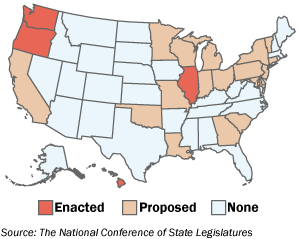Field Notes: Should Bad Credit Mean No Job?

It’s hard to say why someone’s credit history is relevant to employment, but there is no question that credit checks can unfairly limit the upward mobility of minorities and low income people. A Demos study entitled “Bad Credit Shouldn’t Block Employment” examines recent attempts to limit or ban the use of these credit checks and how these laws may be more effective.
The study indicates that while employers are generally not entitled to an applicant's three-digit credit score, they can request reports on various types of debt including medical debt, student loan debt, credit card debt and more. This could bar otherwise qualified individuals from work unfairly due to periods of unemployment, lack of health coverage, or the difficult realities of life that are exacerbated by an inability to gain employment.
The report goes on to show that people of color are more likely to be the target of predatory lending practices and systemic discrimination, which leads to lower credit scores than Caucasians. This may lead credit-based employment criteria to indirectly discriminate against minorities and and struggling populations more generally.
The authors have outlined a few of the key findings of their research:
- Credit check laws are effective at increasing employment among job applicants with poor credit. A new study from researchers at Harvard and the Federal Reserve Bank finds that state laws banning credit checks successfully increase overall employment in low-credit census tracts by between 2.3 and 3.3 percent.
- Despite important goals of reducing barriers to employment and eliminating a source of discrimination, existing state laws on credit checks are undermined by the significant exemptions they contain. Although exemptions are not justified by peer-reviewed research, many state credit check laws include broad exemptions for employees handling cash or goods, for employees with access to financial information, for management positions, and for law enforcement positions. Some legislators also express concern that the number of exemptions that were ultimately included in the laws make them more difficult to enforce.
- Demos research found no successful legal actions or enforcement taken under the laws, even those that have existed for a number of years. While the existence of the laws themselves may deter the use of employment credit checks, it is unlikely that every employer is in full compliance with the laws. Instead, the lack of any enforcement action against employers violating the laws suggests that credit check restrictions are not as effective as they could be.
- A lack of public awareness on the right to be employed without a credit check may undercut effectiveness. A key reason that states have not taken enforcement action is because they receive very few complaints about violations of the law. Demos finds that public education and outreach efforts about the credit check laws have been minimal in many states, suggesting that few people are aware of their rights.
Click here for more quick reads featuring interesting articles on philanthropy and impact investing
Comments are closed here.